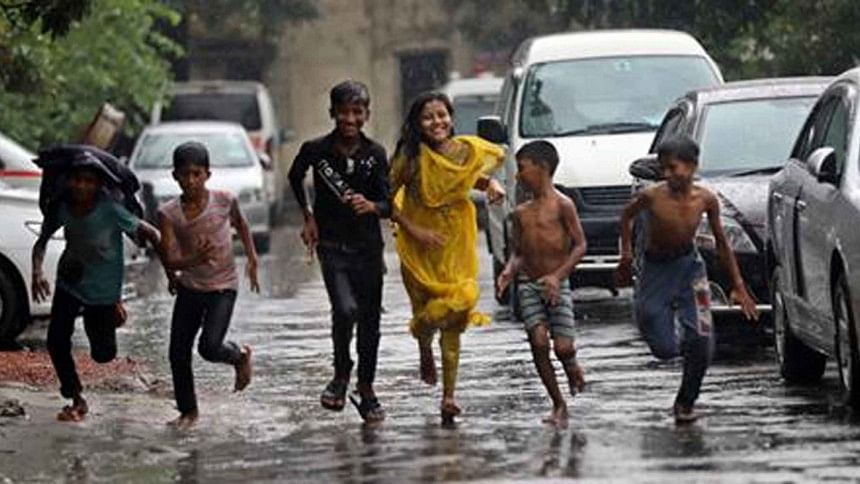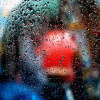Enjoying Dhaka rain doesn't have to be a privilege

There are all sorts of rain – light, flaky ones that lick your skin just enough to pass on the freshness and without intruding on the business of your life. Then, there's the overtly zealous, needle-sharp rain blades, piercing the earth, pitting the puddles of Dhaka city, hitting the windows relentlessly. You cannot but step back and take a pause in the face of such unswerving resolve. Sometimes it buckets down whenever, wherever. It gulps down all other sounds of the city, leaving just this monotone – the best of its kind that prevails as long as the rain lasts. Then, there are those heavy, plump drops that hit your skin with a rounded weight; you almost feel as if you can hold them separately on your palms and play with them, but there they go, lazily clattering around with a splash. The weirdest of them all is the short-lived sun shower that we jokingly celebrate as an occasion for fox weddings, which I remember would get me excited as a child. Only there are no foxes to be wed, yet it's one of those quirks of nature that one just loves.
I have always considered myself as a rain lover, for I love to watch it fall, its rhythmic sound, and its smell. Count this as my confession of a guilty pleasure. What's there to confess, you wonder? Let me explain.
Every time I voiced my love for rainy days or the rain, my brother would smirk that I could only enjoy the sights and sounds of the rain because I was sheltered from it. Only the other day, a colleague of mine wrote something about the inconveniences caused by rain to the general urbanites in a social media post. He claimed that our undying love for the rain was a part of our "collective nostalgia," and the beauty of it all, a magic realist discourse, was found in and passed on from the great Sanskrit poet Kalidas and our very own Tagore.
What this means is that the paean of the rainy season in the context of Dhaka is nothing less than anachronistic and exclusionary, to say the least. It is ridden with inequality, erasures and muted struggles that the rain brings along for most of the people living in the city. In fact, I probably won't be too wrong in saying, there is nothing likeable about the rainy season if you happen to be a Dhaka resident who have to be out and about, rain or shine.
While I love the downpour from the shelter of my home, I don't really want to head out and get drenched while walking, waiting for a rickshaw or a CNG-run autorickshaw eternally, and being splashed on that dirty, foul water from the road. Even worse, I don't want to wade through the waterlogged roads of Dhaka to get to my destination. God forbid if you are a woman and have to walk in sopping (read body-hugging) wet clothes on the streets. You have just attracted an onslaught of oglers; even if they are in the same situation as you, you become a display of the contours of a woman's body and hence, the pleasure cannot be forsaken.
To tell the truth, the rain, or anything that comes from nature that you think is a great equaliser, is a pleasure for the privileged alone. It comes with a price.
Why just the rain? The lush greenery, lakes, canals, and rivers that the city is losing fast under the madness called development only help estrange us further from nature. Making nature a commodity, it only serves to reserve it for the wealthy. Having a yard to do gardening, living near a park, or a water body with all civic amenities is not for the poor or even the vast middle class. Living near nature, amid nature, is a status marker, because nature has a material value and is not free for all anymore.
Hence, to spend time close to nature, we have to go outside of Dhaka or at least to the outskirts. The growing number of resorts that offer day trips to these pockets of freshness is only making the city more antithetical to nature. It doesn't have to be so. Nature is a boon that is the most flexible and easy to be integrated into whatever development we are doing in the name of progress. You don't really have to "go back" to nature, in its wild sense of the term; you bring it in, carry it along, make it part of your living, not just for the mere aesthetics, but also for fostering a quality life that a city can and should offer to its citizens.
What can a city do to mitigate this difference in experiencing nature? Everything! I was fortunate to spend a long period of time in Singapore for my higher studies. It was the same me, loving the rain the same way. Moreover, as a graduate student, public transport was my only option to go about the city. On many occasions, I was on the road when I was caught off guard by the rain. I never had to ask for a taxi to save myself a walk to the bus or train station or to prevent myself from getting wet. I could still appreciate the sights and sounds of the rain, while taking that walk, without an iota of guilt. What was the big difference? The city is planned in a way that you can reach the bus or train station from wherever you are via a shaded walkway. By shades, I don't mean fancy, underground tunnels. Often, they were just corrugated tin shades over the sidewalks and that would be enough. A rainy day was no different than any other days and was never an inconvenience. I'd see the torrents of rainwater gushing through the roads. Before you know it, it would run off the road to the drain and away from your sight! No matter where you live, you experience the rain the same way if you want to. The overhead walkways, shaded of course, are all lined with flowering plants and creepers that make the walk more inviting, and before you know it, you are engaged with the city in the most pleasurable manner, and most importantly, without being away from nature.
All I'm saying is, you don't have to miss out on nature or feel guilty about having access to it just because you live in a city. Is it too much to ask for?
Dr Tabassum Zaman is an associate professor at the Department of English and Humanities of the University of Liberal Arts Bangladesh (ULAB).

 For all latest news, follow The Daily Star's Google News channel.
For all latest news, follow The Daily Star's Google News channel. 







Comments